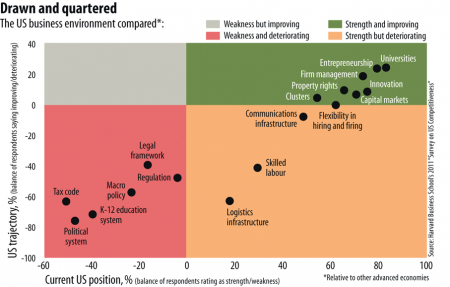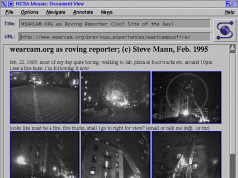Strengths and Weakness of the US Economy (source Harvard/Economist)
How does the US regain its competitive edge and get greener not to mention smarter while doing it? The Economist’s “World In 2013” offers up business guru Michael Porter’s eight steps towards US competitiveness, and it will not surprise MESH Cities readers that working smarter not harder is the key. Well, that and investment in modern infrastructure.
At the core of Porter’s argument is that the US cannot continue to compete globally if it continues to accept declining living standards for its workers as the price for corporate profitability. The US economic juggernaut of past eras balanced opportunities for both sides of the economic machine. Somehow the country has lost the importance of this economic truth as it opened long term, global markets at the expense of its own economy.
People, not companies, are the engine of all economies in an “anti-fragile” world (the reference to N. Taleb’s concept is mine, not Porters, but in this case the two writers have some similar views). Furthermore, the US economic system is mired in contradictory means and ends driven regulations that have to be addressed.
For MESH Cities’ contributors the greatest emphasis outside of regulatory policies must be focused on Porter’s 6th point: Improving logistical, communications, and energy infrastructure. Only that initiative will provide the sustainable, livable environments capable of supporting economic prosperity as a whole.
Here are Porters eight steps. Please refer to the Economist for more details.
- Ease the immigration of highly skilled individuals, starting with international graduates of American universities.
- Simplify the corporate tax code with lower statutory rates and no loopholes.
- Create an international taxation system for American multinationals that taxes overseas profits only where they are earned, consistent with practices in other leading countries.
- Aggressively use bilateral agreements and established international institutions to address distortions and abuses in the international trading and investment system.
- Simplify and streamline regulation affecting business to focus on outcomes rather than costly reporting and compliance, delays and frequent litigation.
- Enact a multi-year programme to improve logistical, communications and energy infrastructure, prioritising those projects most important for reducing the costs of doing business and promoting innovation.
- Agree on a balanced regulatory and reporting framework to guide the responsible development of American shale-gas and oil reserves.
- Create a sustainable federal budget through a combination of greater revenue (including reducing deductions) and less spending (through efficiencies in entitlement programmes and revised spending priorities), embodying a compromise such as Simpson-Bowles or Rivlin-Domenici.







